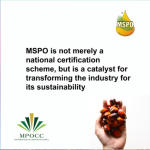DEFROSTING Iceland UK action against palm oil
I am writing this in response to Iceland Foods Ltd “pledge a crackdown on palm oil by removing the ingredient from its own-brand food products”. The reason behind this, it was” alerted to the environmental challenges that palm oil presented by campaigners at Greenpeace and its managing director’s visit to another producing country and saw the environmental devastation caused by expanding palm oil production first hand.”
I am rather amused that Greenpeace did not show Iceland UK Ltd or sponsored its managing directors an all expenses trip to a livestock industry which is a major culprit of deforestation.
An interesting fact which it is either being ignored or refused to be acknowledged by the critics of the oil palm industry is that, in 2006, a study conducted by FAO[1] pinpointed that the livestock industry was the main cause of deforestation. 3.87 billion hectares (Bha) of land were used for livestock production in
2006 and in the same year, oil palm occupied 9.9 million ha (Mha)[2]
Subsequent study[3] “LAND USE IMPACTS OF THE LIVESTOCK AND PALM OIL INDUSTRIES” conducted in 2012 further substantiate the findings. In 2012, land utilized for livestock production increased to an estimated 4.67 billion hectares of which 4.1 billion hectares were used for grazing while another 0.57 billion hectares were used to grow crops to produce animal feed. In 2012, oil palm was cultivated on just 15.6 million hectares.
Without being accused of blowing our own horn, I concur that there may be a handful of unscrupulous characters out there that has tarnished the image of the oil palm industry by adopting unsustainable methods of oil palm cultivation, but these cases are isolated especially in Malaysia and not the norm and is be dealt accordingly by the respective governments.
The majority of oil palm cultivation is done responsibly with legislation and policies prescribe by the producing nation governments to ensure sustainability of the environment.
Therefore I implore Iceland UK to review the facts about palm oil, or is it your strategy to hoodwink the customers and outwit your competitors to generate sales that financially benefit the organization.
I have been in the oil palm industry for the last thirty odd years. In that time, the industry has been through so many changes that, as I look back now, it is hard to believe how far it has come.
What started out as an infant sector with less than one million hectares, has now become one of the main lifelines to many engaging in this sector and to the economic and social success of a country. But not just any country, my country Malaysia, a small nation with an ambitious plan to play its part in world trade and in supplying the global oils and fats needed both in the food and non-food sector.
Today, Malaysia is one of the leading suppliers of palm oil in the global oils and fats market. Mind you the success of the Malaysian palm oil industry was achieved under strict legislations and regulations, with an astute framework of development undertaken by both the government and industry.
The pride Malaysians feel, however, isn’t shared by some other countries.
Palm oil faces stinging contempt from rival and competing oils. Many unsubstantiated claims have been made; unwarranted trade barriers erected; and palm oil has been unjustly asked to provide additional certification requirements – the stringency of which has never been seen in other agricultural sectors.
So why is the West and especially government funded NGOs and environmental groups, so determined and hell bound to curtail the development and production of palm oil, making unsubstantiated and overzealous claims of tropical rainforest destruction and loss of biodiversity, to the extent of depriving the livelihood of more than a million human beings in the plantation and many more in the downstream activities.
The answer is purely protectionism, fear for the loss of their vested interest and market share/access of their own oils and fats production, and to the extent the fear of losing FDI in its economic growth plan.
Yet, through all this, palm oil has managed to maintain its dignity rather professionally.
It has held back and, in some cases, completely dispelled, the negative myths and sarcasm by using the two most powerful tools ever known to man: truth and proof.
They say the truth will set you free. They also say the truth hurts.
This cannot be more accurate for other markets than it is for the palm oil industry.
Malaysia and Indonesia bear testimony to this. After all, these countries are the two largest producers of palm oil, and have their unique stories to share with fair-minded people who would like to know the truth behind what is essentially Mother Nature’s gift to us.
Truth: it was the aim and vision of our wise leaders and forefathers who saw the potential of oil palm as an economic tool to boost progress in their countries. They set the tone. You and I, along with many more generations to come, will taste the success they wanted us to savor.
Truth: today, the oil palm industry has provided prosperous livelihood for countless families and eradicated poverty and hunger where they existed before.
Truth: palm oil provides economic security to families, communities and nations. This gift of nature has profoundly transformed a nation and its people into an economic icon that others may follow.
Truth: palm oil is the most affordable cooking oil and is scientifically-proven to be as healthy as olive oil. Truth: palm oil is global miracle and an economic savior.
So why does the truth hurt?
Could it be because the detractors regard palm oil as a threat? Is it possible that they have lost their economic advantage? Or is it that maybe, in our times of land scarcity, these countries find it difficult to justify their low-yielding crops – and are prepared to fight tooth and nail, regardless fairly or viciously, to cover up their low yielding crops which are proven to damage and destroy the ecology and environment to a much greater extent?
Why do they throw out sensibility and rationality? Is truth so bitter that we can’t look at it straight in the eye? Is it justified for them to adopt coercion through impetuous legislations and policies?
To these distracters I say, “Wake up and smell the roses.” Palm oil is here to stay. Can I back this up? Of course I can.
Faudzy Asrafudeen,
Director of Marketing and Market Development
Malaysian Palm Oil Council
[1] FAO (2006). Livestock’s long shadow: environmental issues and options, pp390.
[2] ISTA Mielke GmbH (2008) Oil World Annual Report 2008
[3] Yusof Basiron and Yew F.K.(2012). Land use effects of the livestock and oil palm industries , Journal of Oil Palm, Environment & Health 2015, 6:1-9.










Leave a Reply